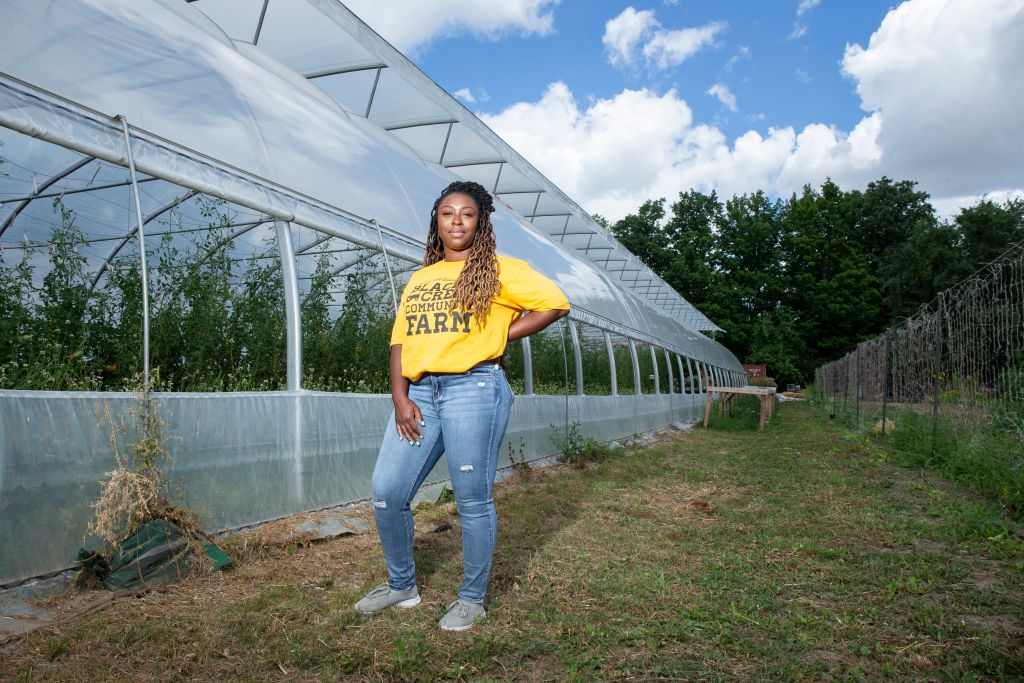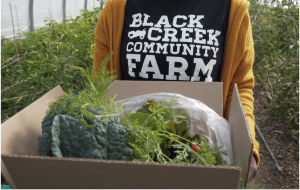
Photo of Ohemaa Boateng, Executive Director of Black Creek Community Farm, standing next to a greenhouse. Photo was taken by: Paige Taylor White
A call to action from Black Creek Community Farm’s Executive Director
I remember growing up in Driftwood Court. After school when my mother would send me to the local mom-and-pop Tadmore convenience store to buy a loaf of bread for $1.00 and a bag of milk for $2.50 I’d come home with change. Gone are those days. It seems like every week the price of food and essentials, and the cost of just living, keep rising. Unfortunately, more families across Toronto are not just feeling the pinch but are being squeezed by rising costs despite the “drop-in-the-bucket” federal grocery rebate, as Hansel Igbavboa, Foodshare’s Right to Food Campaign Coordinator, would call it.
According to the University of Toronto PROOF study, the growing number of families struggling with food insecurity is now estimated to be 1 in 5 Toronto households. When community members experience food insecurity it means they lack the financial means or physical access to nutritious food options to feed themselves and their families. This looks like your neighbour reducing their own food intake in order for their children to have fuller bellies, skipping meals altogether, or heavily relying on our already stretched community food programs and local food banks for nutritious food, their basic needs, and essential items. The reality is that Toronto is currently in third place for the highest proportion of families living below the poverty line in Canada. Not that we want to win that competition.
However, I would like to put a spotlight on the grim fact that while Black and Indigenous communities make up less than 10 percent of the population of Toronto, prior to the COVID-19 pandemic 1 in 3 of these households (33%) were impacted by food insecurity (UofT Proof Study), compared to 1 in 8 non-visible minority households (13%). The same study found that in 2021, female lone-parent households had the highest rate of food insecurity at 38.1%, and these odds are more than double when compared to couples with children.
Last year, Statistics Canada collected data from January to June of 2022 and revealed that these numbers have only gotten worse since the pandemic. Almost 40% of Black households (2 in 5) are now experiencing food insecurity. Food insecurity in female lone-parent households has increased by 10% to 43%. 1 in 4 children under the age of 18 now live in a food-insecure household. This amounts to almost 1.8 million children experiencing food insecurity Canada-wide in 2022, an increase from 1.4 million in 2021 (Canadian Income Survey).
Across Canada, the cost of groceries has gone up by almost 11% since 1981. And we are currently seeing an affordability crisis thanks to the compounding effects of the pandemic, rising inflation, a lack of socio-economic support, and growing wage disparities, which are putting greater pressure than ever on low-income community members who have already been dealing with marginalizing factors such as being racialized as Black or Indigenous, being elderly, having disabilities, and/or providing for a single parent household.

Staff harvests fresh organic produce from the greenhouses and fields for the Emergency Food Box program.
During the pandemic, Black Creek Community Farm responded to the disproportionate impacts of COVID-19 on the Black Creek/Jane-Finch community by implementing the Emergency Food Box program. We delivered 33,208 emergency food boxes locally, equivalent to over 540,000 lbs of fresh produce. I personally want to express my heartfelt appreciation for the donations made to Black Creek Community Farm by individuals and organizations during those hard times when we were able to deliver 700 boxes every week, myself being one of the recipients of the program. But while the program has come to an end as our funding has declined, the hard times have not ended for a growing number of families in our community and the food security crisis persists.
Food insecurity is both an urgent need and a reflection of how our current systems and policies have failed to promote income security. Toronto has failed to fulfill its commitment – unanimously adopted by our City Council in the Toronto Food Charter in 2001 – to uphold our right to nutritious, affordable, and culturally-appropriate food. We need municipal leadership that recognizes food insecurity as a systemic issue that requires meaningful systemic policy solutions and an increase in social benefits for equity-seeking groups. Specifically, we need a reallocation of funding and resources to help the Black and Indigenous folks most impacted by the failures of our current food system. I urge you to keep this in mind when it comes time to vote in the upcoming Toronto mayoral election on June 26th. Advance polls are open from June 8 to 13. You can find your voting location here.
Black Creek Community Farm, like many food justice organizations in the city, will continuously strive to increase access to healthy food in our community through our programming and food distribution projects. To support the farm and the work we do, you can join forces with our amazing team as a volunteer, sign up for our newsletters to stay in the know, or become a monthly donor to support our work. No donation is too small and your generosity will make a big impact in our community. Donations over $10 will receive a tax receipt. Your receipt can then be submitted with your annual tax return to receive a tax credit of up to 53 percent of your donation.
I invite you to stand with us and add your voice to Foodshare’s petition for the Right to Food campaign, calling for all of us to have the legally respected right, not the privilege, to access food in a dignified manner.
If you or someone in your household is experiencing food insecurity, please contact 211 to find local food banks or food programs in your area. Or check out this Food Asset Map with a list of all the local food banks or programs in the GTA.
Ohemaa Boateng
Executive Director, Black Creek Community Farm
We want to hear from you! What are you noticing about your grocery shopping habits? Are you finding you are paying more, the same, or less for your food and essentials? What have you been doing to manage your food costs, food waste, and/or budget? How has that been impacting you and your household? What are tips you’ve learned over the last few years to help manage spending?
Share Your Story
